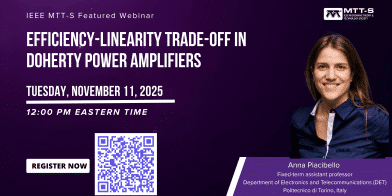
-
Tuesday, November 11, 2025 12:00 pm - 1:00 pmNew York Add to my calendar
Efficiency-linearity trade-off in Doherty Power amplifiers
Anna Piacibello
Fixed-term assistant professor
Department of Electronics and Telecommunications (DET)
Politecnico di Torino, Italy
Abstract:
Power amplifiers (PAs) are key components in wireless transmitters, where they influence both power efficiency and linearity — a key factor in maintaining signal quality and minimizing distortion. This webinar focuses on the Doherty power amplifier architecture, widely adopted for its efficiency benefits in power back-off operation, and examines the fundamental trade-off between efficiency and linearity in its design and implementation. The talk provides a theoretical foundation for understanding this trade-off and explores strategies to mitigate it through advanced design techniques. Emphasis is placed on recent research in wideband and multi-stage Doherty architectures, including published results that demonstrate practical solutions and performance trends in modern communication systems.
Speaker’s Bio:
Anna Piacibello (Member, IEEE) was born in Chivasso, Italy, in 1991. She received the bachelor’s and master’s degrees in electronic engineering and the Ph.D. degree (cum laude) in electric, electronic and communication engineering from the Politecnico di Torino, Turin, Italy, in 2013, 2015, and 2019, respectively.,In 2017, she was a Visiting Researcher with the Centre for High Frequency Engineering (CHFE), Cardiff University, Cardiff, U.K. She is currently an Assistant Professor with the Department of Electronics and Telecommunications, Politecnico di Torino. Her research interests include the design and characterization of microwave and millimeter-wave electronic circuits, mainly focusing on broadband highly efficient power amplifiers.,Dr. Piacibello has been an Affiliate Member of the IEEE MTT-S Technical Committee TC-12 on Microwave High-Power Techniques since 2022. She was a recipient of the 2018 Young Engineer Prize awarded by the European Microwave Association (EuMA).